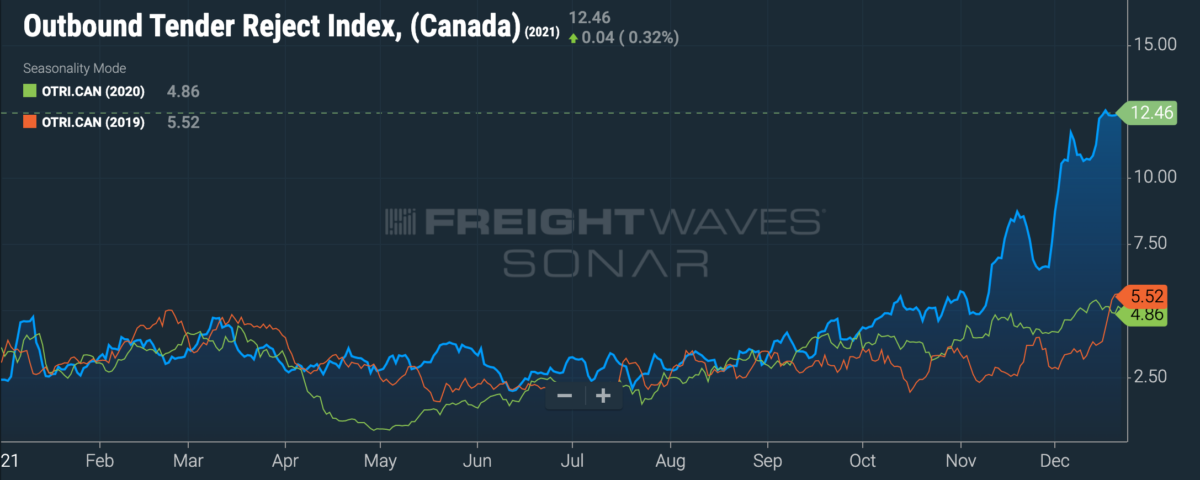As 2022 begins, shippers need help managing their New Year’s resolutions to move freight across North America as efficiently as possible. Of course, improving freight management health and dropping unwanted costs are at the top of everyone’s resolution list.
Through the ups and downs of the past two years, we’ve learned a lot about improving freight management. So what’s in store for 2022? It’s hard to say for sure, but it’s best to anticipate a tighter market.
Ever-tightening capacity may continue to snare shippers that haven’t planned accordingly, especially those involved in cross-border trade across the North American markets. So for North American shippers, their New Year’s resolution should be to straighten out their capacity demands.
According to the Outbound Tender Reject Index for Canada on FreightWaves’ SONAR platform, Canadian truckload capacity has never been tighter. In fact, tender rejections north of the border are catching up with U.S. figures as rates have been sharply increasing since early November, far exceeding 2019 and 2020 totals.

Entering the new year, Giles Moore, director of strategic business development at FLS Transportation, suggests that shippers should focus more on accurately predicting their capacity needs over the next few quarters on a lane-by-lane basis. In addition, he argues that labor shortages and the scarcity of new equipment production globally may further constrain supply chains.
“We already know the capacity constraints of today, and it’s tough for customers to predict what’s going to happen in the next three to six months,” Moore said. “We know that it’s not going to get any easier, so building that trust with customers quickly and performing at the best of our ability is important.”
It’s not uncommon for many shippers to consider cross-border freight as an afterthought since it makes up a smaller portion of their overall supply chains, but Moore urges shippers, more specifically Canadian shippers, not to overlook such a critical process.
Although Canada has a population of 38 million and its economy is very similar to that of the U.S., moving goods across the border has many challenges, and this is where customers rely on the expertise at FLS Transportation.
For the past 35 years, FLS Transportation’s mission has been simple: Deliver every load on time, every time, with the least amount of headaches.
FLS Transportation is a valuable resource for the North American supply chain as it has an abundance of capacity. Having roots in Montreal as a Canadian domestic carrier, FLS Transportation has become a leading 3PL for cross-border freight since entering the U.S. market in 2005. FLS Transportation boasts one of the most robust relationship networks available today, with 18 offices across North America, working actively with 54,000 carriers.
Handling all freight types across all major modes of transportation throughout North America, FLS Transportation has achieved year-over-year compound sales growth of 30% and 28% compound profit growth per year since 2005, surpassing $600 million in revenue in 2021.
What’s more, FLS Transportation has the technology tools shippers want. From receiving quotes, booking loads, keeping track of shipments in real time and managing invoices, FLS Transportation’s digital freight platform ensures shippers stay on top of the action and stay connected with carriers via EDIs or API integrations through the FLS Shipper Portal.
“You can input any PRO number into our system to receive driver pings on any particular shipment,” Moore said as he discussed FLS Transportation’s real-time track-and-trace technology.
Moore said those that haven’t been quick to adopt API technologies would have significant challenges moving forward. But while technology adoption is crucial to any supply chain, he acknowledges that this is still a people-driven industry and that behind each shipment is a group of individuals who made its safe journey possible.
For this reason, Moore stresses the importance of establishing a high level of trust between the customer and the logistics provider. “We approach our clients with the utmost confidence and care, knowing that the shipments we cover are handled consistently and competitively,” he said.
FLS Transportation focuses on customer relationship management and building long-term commitments with its shippers and carriers, resulting in reliable capacity, fair rates and available lanes.
FLS account managers are diligent and resourceful as they work to meet every shipper’s unique needs. The team at FLS delves deep into the shipper account history, analyzes the supply chain environment taking into account external market forces, and then discusses the logistics strategy with their customers.
“Those are the types of conversations that we like to have with our shippers so that we not only know what our role is going to be within their company but more importantly to assist them as a knowledge leader and a support base, which forms a committed relationship between our two organizations to get ahead of any problems.”











